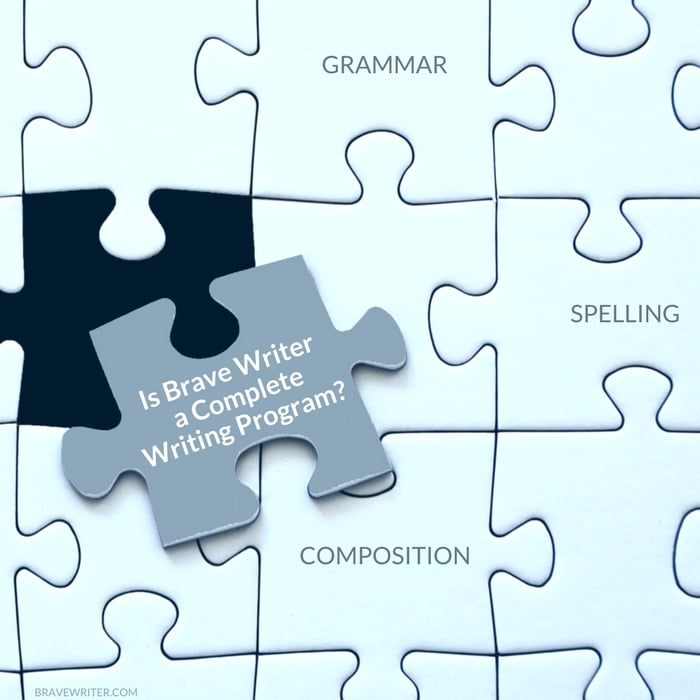Is Brave Writer a Complete Writing Program?

Brave Writer is a complete writing and language arts program, not supplemental. The goal of what we do is to prepare kids to be competent, confident writers in a variety of settings, including academic contexts like college and beyond. We get there by beginning with writing voice and nurturing it so that a child discovers what it feels like to have something to say, something worth preserving on paper or on a computer. That self expression puts a child in touch with the part of self that generates original thought, accesses his or her vocabulary, and selects the best “container” for their writing (does this material suit a poem or a report, a letter or an academic essay?).
Where we differ from other programs is that we are not organized by grade level, but by developmental stages of growth in writing. We see writing in three categories:
- original writing (the process of generating original thought and putting that into the written word),
- the mechanics of writing (which we explore using living literature and the practices of copywork and dictation),
- and writing projects (bringing mechanics and thoughts together to create something—lapbook, mini report, a poster, textual criticism in an essay, research papers, and so on…).
The Writer’s Jungle is the primary manual that teaches both philosophy and process using a variety of activities and writing excursions. It is written to the homeschooling parent and is not a text book. Each chapter has a writing process to do with your child with samples and explanations about its application to the writing process.
The Wand, Arrow, and Boomerang offer a monthly literature guide focused on a single novel that is age appropriate. In these month-long guides you will find 4 weeks worth of copywork and dictation with detailed, user-friendly descriptions of the
- literary elements,
- grammar,
- spelling,
- and punctuation found in the passages.
The products like Jot it Down, Partnership Writing, Faltering Ownership and Help for High School are focused on writing products/projects. This is where we introduce forms for writing—but we get there differently than most writing programs. We focus first on
- immersion in material,
- developing original thought,
- examining one’s own perspective against others,
- and creating space for creativity (btw, creativity is just as necessary for a persuasive essay as it is for a poem).
Then we explore the convention of the form for writing and look at ways to apply it to the content generated by the student.
We take revision seriously—it is not just a process of correcting a few typos or spelling errors, or hunting in a thesaurus for a better term. Revision in Brave Writer is about giving new vision to the writing—engaging in a process of re-imagining the content—deepening and expanding it.
Our online classes cover all three aspects of writing: original thought, mechanics and literature, and writing forms.
It is possible to do only Brave Writer materials and classes for the entirety of your child’s childhood. That said, it’s also wise to give your kids the chance to write in additional contexts as well so that they experience how other people teach writing. I usually recommend including some other writing opportunities in high school (co-op, local junior college, working with another writing instructor) once the writing voice is strong and well formed. We do have a wide variety of writing coaches in Brave Writer, though, and that provides its own variety too.
I come from professional writing. What we do when we work with people aspiring to be writers is we stir up the writing life first.
We say: What do you have to say? Then we help them get that out.
Schools tend to say to students: Writing is difficult so I’m going to tell you exactly what to write and how.
In the school context, kids lose touch with having something to say and keep trying to figure out what the teacher wants to read.
In the professional context, the writer gets more and more in touch with having something to offer. That makes learning the various forms not only more interesting, but more powerful. The writing then sounds like them!
Adding one last thought about academic writing: I teach at the university level. What most professors complain about with college writing is that students know the formulas for writing but don’t have much skill with original thought or critical inquiry of texts. There’s a hunger among academics for students to break free of the rigid formulas and to connect with the discipline or the field.
In our high school writing classes, we do teach the academic forms, but we do so with a view to ensuring that our students generate insight first and that they learn how to do the rhetorical work of examining sources for credibility, understanding point of view, and learning to hold positions dispassionately.
Our students who have gone off to college and return to tell us about it have said that their professors often praise them for their original thought or that their writing sounds like them—not a formula. We use college composition principles and teach the MLA citation structures, but not at the expense of cultivating a writer’s rhetorical imagination. We do both. We just save that academic specificity for high school when the mind is more mature and ready to do that kind of work.


















